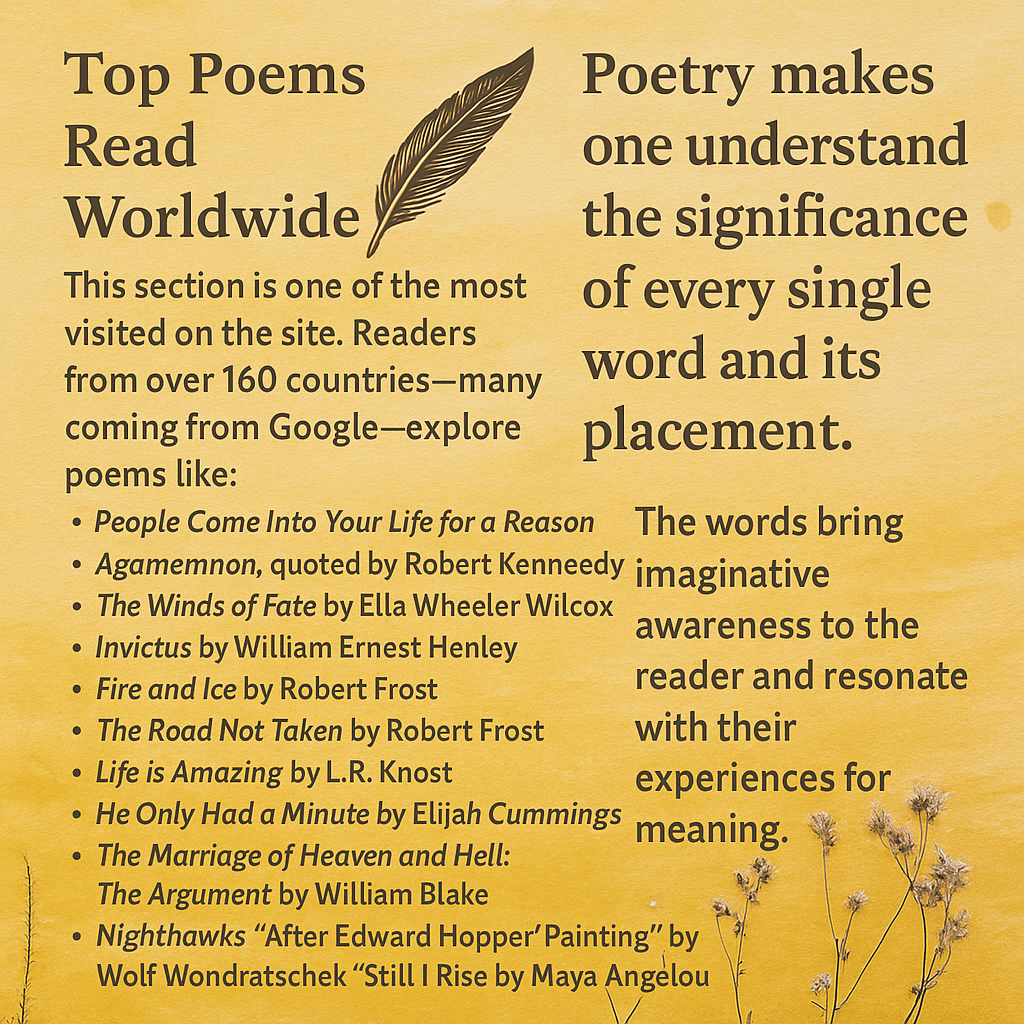Still, We Rise
“You may trod me in the very dirt
But still, like dust, I’ll rise.”
—Maya Angelou, Still I Rise
3
ff
Th
“You may trod me in the very dirt
But still, like dust, I’ll rise.”
—Maya Angelou, Still I Rise
Henry Wadsworth Longfellow - 1807-1882
One ship drives East and another West,
With the self-same winds that blow.
’Tis the set of the sail, and not the gale,
Which tells us the way to go.
“Never a day did I feel more loved & lovely
Never a day did I soar as more me
Where absolutely nothing was held above me
But waiting always before me”
It is by no means an irrational fancy that, in a future existence, we shall look upon what we think our present existence, as a dream. —Edgar Allan Poe
(is it a poem or a song?)
Poetry Can Inspire and Shape Feelings and Emotions That can Lead to Nonfiction
"The Winds of Fate” by Ella Wheeler Wilcox.
One ship drives east and another west,
With the self-same winds that blow.
’Tis the set of the sail, and not the gale,
Which tells us the way to go.
Henry Wadsworth Longfellow - 1807-1882
Eldorado the Poem by Edgar Allen Poe
Read moreThis poem never spread because of marketing. It spread because it spoke to something universal. For years, it has been one of the most visited pages on this site—often by readers searching for clarity in the middle of transition, loss, or necessary change.
It continues to influence how I think about relationships, timing, and how people shape our lives in ways we often don’t recognize until much later.
“People come into your life for a reason, a season, or a lifetime.”
You’ll know which it is once you understand what role they played.
When someone enters your life for a reason, it’s usually to meet a specific need. They appear during a moment when you require support—emotionally, spiritually, or practically. Their presence fills an important gap, often one you didn’t consciously acknowledge. And then, unexpectedly, they leave. Not because anyone failed, but because their purpose is complete.
Some people come for a season—a chapter marked by growth, laughter, or discovery. These relationships are vivid and real, but temporary. They enrich us, expand us, and then they end. Their significance isn’t measured by their duration but by the imprint they leave behind.
A few people become part of our lives for a lifetime. They build foundations with us. They teach us enduring lessons about friendship, resilience, honesty, and love. These relationships are the anchors we return to, again and again. As the saying goes, “Love is blind, but friendship is clairvoyant.”
Many people return to this poem because it gives language to something they’ve felt intuitively—that people cross our paths with purpose.
That relationships aren’t random.
That endings aren’t failures.
Even difficult relationships can act as teachers, revealing what we must learn, release, or no longer repeat. The poem offers more than comfort—it creates a framework. One that encourages acceptance, gratitude, and a gentler understanding of impermanence.
It reminds us that our lives are shaped—sometimes quietly—by the people who touch them.
This website began as a place for book reviews. Only later did I add a small collection of poems and reflections that mattered to me personally. I didn’t expect this one to become the most visited page on the site. But it has—and consistently.
Its message sits at the heart of what I write about:
reinvention, seasons of life, personal narrative, and the quiet way we grow when we’re paying attention.
This poem helped shape the thinking behind several of my books, including:
Why Life Stories Change: As You Look At Your Own Life Story, You See Yourself Differently
Why Life Stories Change: Are We the Result of Chance or Circumstance?
Embrace Life’s Randomness: Your Path to Personal Reinvention and Positive Change
Its influence continues to guide how I write—and how I understand the role of people in our lives.
This related essay explores how revisiting your past can reshape how you see your present—and why our stories change as we change.
➡ Read: If It Really Was My Life Story, Why Does It Change Each Time I Tell It?
Our stories evolve because we evolve. Details fade or become clearer. What once seemed unimportant becomes pivotal in hindsight. We reinterpret events through the lens of who we’ve become.
For over 35 years, I participated in a monthly men’s group where we shared our life stories. As people repeated their stories over the years, something interesting happened: the stories changed—not the facts, but the meaning.
New understanding had settled in.
New perspective had taken root.
This insight echoes the poem’s core message:
People and events shape us, often long before we realize how. And as we change, our interpretation of those relationships changes too.
You can continue with these related reflections:
The Tide Rises, the Tide Falls, by Henry Wadsworth Longfellow
Read moreA Question, by Robert Frost
A voice said, Look me in the stars
And tell me truly, men of earth,
If all the soul-and-body scars
Were not too much to pay for birth
